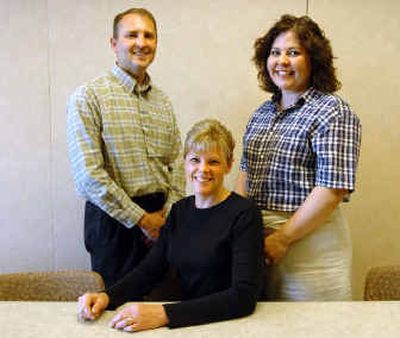Hayden teacher opening Christian school

Watching Hayden teacher Julie Yetter pronounce words at the home-school spelling bee earlier this year, one would hardly think she had problems learning. But what Yetter announced afterward to the students brought looks of surprise.
After all – she’s accomplished. Yetter teaches 11 students in her home, home schools three of her four children, and is the founder of the successful Idaho Home School Network in Post Falls, serving 175 students in 50 subjects. Collaborating with her parents, Robert and Verda Newell, both retired university professors, and her brother, James Newell, a teacher, she’s created Genesis Preparatory Academy, a private Christian school for grades 6-12 she plans to open in the fall.
Certainly Yetter’s zeal for teaching is obvious. But teaching was the last thing she planned to do – she has secondary language disorder, more commonly known as dyslexia. The disorder makes reading – and learning – difficult.
It was that news that was the source of the surprised looks at the spelling bee, but Yetter’s story about how she overcame the disorder is also a source of inspiration.
Excited as a youngster to begin school, Yetter soon encountered problems. “By the end of first grade, I’d gone from an A to a C student, and hated reading,” she recalled. “I was placed in the slow group, which just meant dumb, to me. As many students do, I compensated for poor reading and spelling skills by learning to fake my way through. I’m an auditory learner, and quickly adapted my ability to pick up what I needed to learn by listening. I never overcame that resistance to reading, although I learned to read well enough.”
When Yetter entered secondary school, she found encouragement from two teachers who prodded her to read.
“My senior year I studied Shakespeare, as I liked theater. I fell in love with the Bard, but I still wasn’t running off to become an English major,” Yetter said. “My first two years of college I studied business because it was practical.”
Then, the Boise native left Idaho for Washington, D.C., where she “worked for two years at the Smithsonian Institute, spending hours conversing with well-read, political types,” and fell in love with literature.
“Literature became my friend,” she said.
Before long, she returned to the University of Maryland to become a teacher, and literature was her passion. She knew she faced obstacles.
“While getting my education degree, I came to terms with my learning disabilities,” she said. “It became important to me to learn how to address students’ learning differences without labeling them.
“What I discovered is most of us have learning issues of one nature or another. However, many education approaches documented as successful aren’t employed in classrooms because of the nature of how schools manage and promote students. Strategies such as smaller class size, multisensory instruction, master learning techniques and teaching to students’ learning styles are proven methods for improving learning. However, most schools continue to use traditional classroom models.”
When Yetter was growing up, few students were tested for learning disabilities. Struggling students placed in slower tracts were generally stigmatized, incorrectly, as being less intelligent.
After receiving her teaching degree and home-schooling her children for seven years, the Yetter family returned to Idaho in 2003. Immediately, Yetter saw the need for a home-school network. With a friend’s encouragement, the Idaho Home School Network was born (www.idahohomeschoolnetwork.com).
Yetter also finds time to teach private students and home school some of her own children.
“On a typical day, I get my husband, Joe (a CPA at Sterling Savings Bank in Spokane), and my son, Kyle, out the door early (Kyle currently attends eighth grade at Coeur d’Alene Charter Academy). The rest of the crew then sits down to home school,” she said. “Beatrice is in third grade and Rolan is in fifth. I have one private third-grade student who comes mornings on Monday to Wednesday.”
But that’s just the half of it.
“At noon I have 10 sixth- to ninth-grade private students from noon to 3:30, Monday to Wednesday, to tutor in core subjects. My daughter McKenna’s in sixth grade and participates in that. Afternoons are filled with sports and errands. Thursdays, we attend Home School Network classes all day. We clean the house on Fridays, and get ready for the weekend. Church activities and games fill our weekends.”
Genesis Preparatory Academy is Yetter’s latest venture. This time she’s teaming up with her family and members of the community.
David Warnick will be the school’s debate coach. He’s coached high school debate at Coeur d’Alene High School. Warnick’s wife, Nikki, who is Yetter’s sister, will help with bookkeeping.
Yetter’s teaching experience covers classroom instruction in English, speech and drama, and workshop teaching of writing, literature and rhetoric.
Yetter’s brother is finishing his master’s in business education at the University of Idaho, and will be certified as a high school business teacher. He teaches classes in computer technology, business law and accounting.
Yetter’s enthusiasm about the new school is contagious as she talks about individualized programs for students, “personally challenging academics, and innovative practical business experiences utilizing cutting-edge technology and ideas.
“Genesis Preparatory Academy students will be prepared for life,” she said.
Yetter’s story inspired those at the spelling bee. Evidently, those suffering with language disorders often become very successful in their chosen professions.
Just ask Julie Yetter.